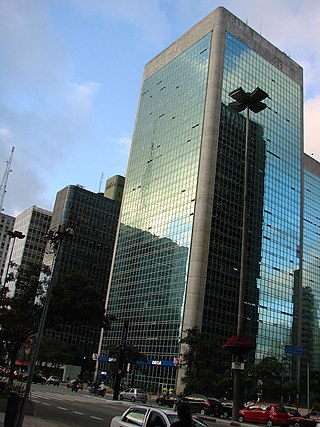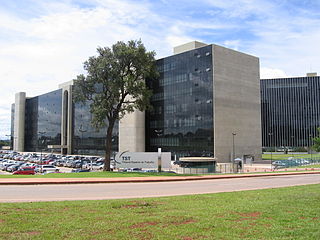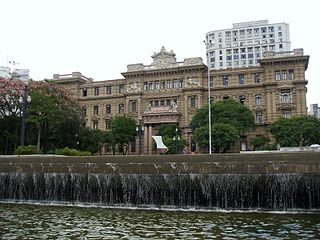This article relies largely or entirely on a single source .(January 2018) |

Desembargador is a Portuguese title given to some appellate judges in Portugal, Brazil and other countries influenced by the Portuguese legal tradition.
This article relies largely or entirely on a single source .(January 2018) |

Desembargador is a Portuguese title given to some appellate judges in Portugal, Brazil and other countries influenced by the Portuguese legal tradition.
Historically, the title desembargador was given to the judges of some of the higher courts of the Kingdom of Portugal and, later, of the Portuguese Empire. Desembargadores were judges of the Desembargo do Paço (supreme court), of the House of Supplication (court of appeal for the southern provinces of the Kingdom) and of the several courts of relação (regional courts of appeal). The first Relação court was created in Porto by the transformation of the former Civil House court. Additional relações were later created after in the Portuguese overseas cities of Goa (1544), Salvador da Bahia (1609), Rio de Janeiro (1751), São Luís do Maranhão (1812) and Recife (1821).
After the independence of Brazil was won from Portugal in 1822, the title continued to be applied in both countries and in the remaining parts of the Portuguese Empire to the judges of certain courts of appeal.
The Brazilian Constitution of 1988 defines desembargadores as the judges of the Courts of Justice, which are appellate courts of the state court system. Judges of the state first instance courts are called juízes de direito (judges of law).
In 2001, the Regional Federal Court of the 4th Region determined that judges of such courts should be called desembargadores, instead of simply juízes federais, or federal judges, which was the name of their office until then. It was followed by the Regional Labor Courts renaming their labor judges to desembargadores too. First instance federal judges/labor judges continued being called juízes federais/juízes do trabalho.
This determination was criticized by the federal judge Julio Guilherme Schattschneider, who said that it was the equivalent to the President issuing a decree saying that they should be called Prime Minister. He said that the Court gave a bad example because its determination was unconstitutional, given that the Constitution determines that all federal judges, regardless of being appellate court judges or not, be called juízes. [1]
With the reform of the Justice system in the early 1830s, following the establishment of the Constitutional Monarchy in Portugal, the title juíz desembargador or simply desembargador became reserved only for the judges of the courts of relação. Presently, there are five of those courts, one each in the cities of Porto, Lisbon, Coimbra, Évora and Guimarães. By comparison, the judges of first instance are titled juízes de direito (judges of law) and the judges of the Supreme Court of Justice are titled conselheiros (councilors).
The judges of the courts of administrative and tax jurisdiction have analogous titles and so those of the two regional central administrative courts (courts of appellate seated in Lisbon and Oporto) are also titled desembargadores.

A judge is a person who presides over court proceedings, either alone or as a part of a panel of judges. In an adversarial system the judge hears all the witnesses and any other evidence presented by the barristers or solicitors of the case, assesses the credibility and arguments of the parties, and then issues a ruling in the case based on their interpretation of the law and their own personal judgment. A judge is expected to conduct the trial impartially and, typically, in an open court.

A tribunal, generally, is any person or institution with authority to judge, adjudicate on, or determine claims or disputes—whether or not it is called a tribunal in its title. For example, an advocate who appears before a court with a single judge could describe that judge as "their tribunal." Many governmental bodies are titled "tribunals" to emphasize that they are not courts of normal jurisdiction. For example, the International Criminal Tribunal for Rwanda was a body specially constituted under international law; in Great Britain, employment tribunals are bodies set up to hear specific employment disputes. In many cases, the word tribunal implies a judicial body with a lesser degree of formality than a court, in which the normal rules of evidence and procedure may not apply, and whose presiding officers are frequently neither judges nor magistrates. Private judicial bodies are also often styled "tribunals." The word tribunal, however, is not conclusive of a body's function—for example, in Great Britain, the Employment Appeal Tribunal is a superior court of record.
António Diniz da Cruz e Silva was a Portuguese magistrate and heroic-comic poet, son of a Lisbon carpenter who emigrated to the Portuguese colony of Brazil shortly before the poet's birth, leaving his wife to support and educate her young family by the earnings of her needle.

The Supreme Federal Court is the supreme court of Brazil, serving primarily as the Constitutional Court of the country. It is the highest court of law in Brazil for constitutional issues and its rulings cannot be appealed. On cases involving exclusively non-constitutional issues, regarding federal laws, the highest court is, by rule, the Superior Court of Justice.

The Court of Final Appeal of Macau is the court with the final adjudication power on laws of Macau. Prior to 1999, the highest court was the Higher Court of Justice of Macau and prior to that the Court of Appeal of the Judiciary District of Lisbon in Portugal.

The law of Brazil is based on statutes and, partly and more recently, a mechanism called súmulas vinculantes. It derives mainly from the civil law systems of European countries, particularly Portugal, the Napoleonic Code and the Germanic law.

The Superior Electoral Court is the highest body of the Brazilian Electoral Justice, which also comprises one Regional Electoral Court in each of the 26 states and the Federal District of the country, as determined by the Article 118 of the Constitution of Brazil.

The judiciary of Portugal is a system of courts that together constitute one of the four organs of Sovereignty as defined by the Portuguese Constitution. The courts are independent from the other three Portuguese organs of Sovereignty.

The Superior Court of Justice is the highest appellate court in Brazil for non-constitutional questions of federal law. The STJ also has original jurisdiction over some cases. Its competence is described in Article 105 of the Brazilian Constitution of 1988.

The Regional Federal Courts are the courts of appeal in the Federal Courts of Brazil, the second instance courts of the Brazilian federal justice system, responsible not only for appeals of trial court decisions, but also for writs of security, habeas corpus, and habeas data against acts by federal judges, motions to set aside judgments, criminal revisions, and conflicts of jurisdiction.
The federal court system of Brazil has all its organs and competences listed and defined in the Brazilian 1988 Constitution. The National Justice Council is an exclusively administrative organ of the federal court system.
Regional Labor Courts are Brazilian appellate courts of the Federal specialized court system for matters of labor law. There currently are 24 Regional Labor Courts, geographically defined by numbered Regions.

The Superior Labor Court, is the highest Brazilian appellate court for labor law issues. Its headquarters are located in Brasilia, near the American Embassy.

The Judiciary of Brazil is the group of public entities designated by the Brazilian constitution to carry out the country's judicial functions.
The Federal Government of Brazil is the national government of the Federative Republic of Brazil, a republic in South America divided into 26 states and a federal district. The Brazilian federal government is divided into three branches: the executive, which is headed by the President and the cabinet; the legislative, whose powers are vested by the Constitution in the National Congress; and the judiciary, whose powers are vested in nine organs, including the Supreme Federal Court and lower federal courts. The seat of the federal government is located in Brasília.
Paulo Pinto de Albuquerque is a Portuguese judge born in Beira, Mozambique and was the judge of the European Court of Human Rights in respect of Portugal from April 2011 to March 2020.

The Court of Justice of São Paulo is the judicial branch of the Government of São Paulo. Its head office is in the capital and it has jurisdiction across the state.

Antônio Luís Pereira da Cunha, first and only viscount of Inhambupe de Cima and marquis of Inhambupe, was a Brazilian magistrate, appellate judge (desembargador) and politician.
This glossary contains Brazilian terms related to criminal or corruption investigations, and supporting concepts from politics, the law, government, criminology, and law enforcement.

Kássio Nunes Marques is a Brazilian magistrate, currently a Justice at the Supreme Federal Court.